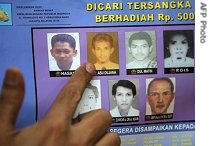-
(单词翻译:双击或拖选)
Jakarta
13 June 2007
Indonesian police have arrested one of the country's most-wanted Islamic terrorists, Abu Dujana, the alleged1 head of the military wing of the Southeast Asian terrorist network Jemaah Islamiyah. VOA's Nancy-Amelia Collins in Jakarta has more.
 |
| Police spokesman Sisno Adiwinoto points to a picture of Abu Dujana printed in a most wanted poster during a press briefing in Jakarta, 13 Jun 2007 |
Dujana is the most wanted member of the organization. Ken2 Conboy, a security expert and author of several books on the terrorist organization, refers to Dujana as the Emir - the Arabic word for "leader" - and says his arrest is significant.
"He is very important on a symbolic3 level. To get at the Emir? Very important. And as far as recruitment - he does play a role in recruitment, in a more general way. JI is going through a major rebuilding phase right now. So his recruitment skills are very key," said Conboy.
Jemaah Islamiyah, which has links to the al-Qaida terrorist network, advocates the creation of an Islamic state across much of Southeast Asia.
The group's members have been accused in a series of bombings in Indonesia and the Philippines in the past few years, including attacks on the resort island of Bali and blasts at the J.W. Marriott Hotel and the Australian Embassy in Jakarta. Altogether, more than 240 people were killed in the bombings.
Presidential spokesman Andi Mallarengang hailed Dujana's arrest.
"We are always committed and serious about fighting terrorism," he said. "Terrorism is our common enemy of the people and this shows also that our police forces are committed and doing what they can to destroy terrorism in Indonesia."
The Indonesian authorities have arrested and convicted more than 300 JI members since the 2002 Bali bombing that killed 202 people.
Terrorism experts say, because of the arrests and disagreements over tactics, the group has weakened and splintered into several factions4. All are trying to recover and regroup.
Analysts5 such as Conboy say Indonesia has been transparent6 and democratic in its fight against terrorism.
"I think you have got to remain vigilant7, but I think Indonesia has been a quiet success story, they have really pulled back JI to the pre- [1998] '98 level where they really were just involved in recruitment and building up their cells and they are not really focused on carrying out operations just yet because they are so focused on rebuilding," said Conboy.
Indonesia is a secular8, democratic nation with the world's largest Muslim population. The vast majority practices a moderate form of the faith, but a small and active minority espouses9 Muslim militancy10.
 收听单词发音
收听单词发音
1
alleged

|
|
| a.被指控的,嫌疑的 | |
参考例句: |
|
|
|
2
ken

|
|
| n.视野,知识领域 | |
参考例句: |
|
|
|
3
symbolic

|
|
| adj.象征性的,符号的,象征主义的 | |
参考例句: |
|
|
|
4
factions

|
|
| 组织中的小派别,派系( faction的名词复数 ) | |
参考例句: |
|
|
|
5
analysts

|
|
| 分析家,化验员( analyst的名词复数 ) | |
参考例句: |
|
|
|
6
transparent

|
|
| adj.明显的,无疑的;透明的 | |
参考例句: |
|
|
|
7
vigilant

|
|
| adj.警觉的,警戒的,警惕的 | |
参考例句: |
|
|
|
8
secular

|
|
| n.牧师,凡人;adj.世俗的,现世的,不朽的 | |
参考例句: |
|
|
|
9
espouses

|
|
| v.(决定)支持,拥护(目标、主张等)( espouse的第三人称单数 ) | |
参考例句: |
|
|
|
10
militancy

|
|
| n.warlike behavior or tendency | |
参考例句: |
|
|
|















